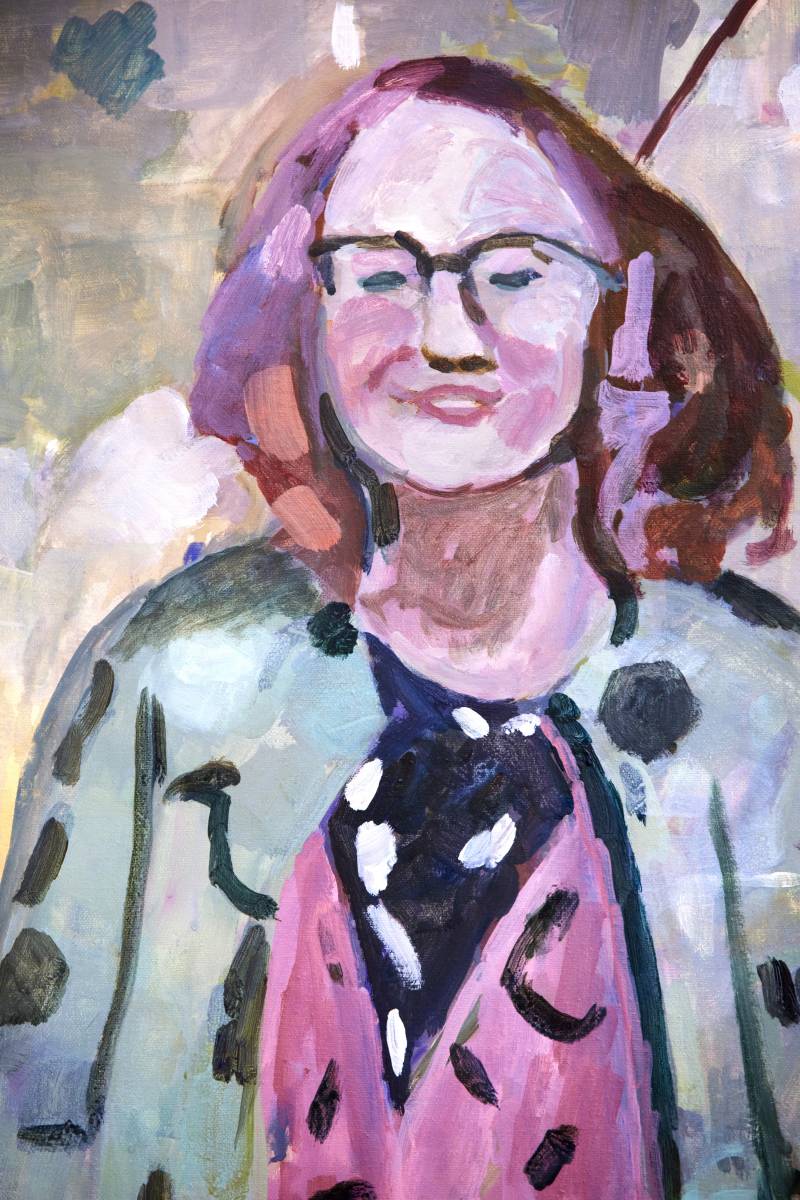'I could build relationships, support other people and make each day a little better by smiling'
A portrait of physiotherapist Alexandra Clinton appears in an exhibition that is being held at Stockport War Memorial Art Gallery until 11 April. The exhibition aims to capture the experiences of staff at Stockport NHS Foundation Trust during the Covid-19 pandemic through a series of portraits undertaken by local artists.
Alexandra, who is the clinical lead physiotherapist at the Cedar House pain clinic at Stepping Hill Hospital, says she felt a ‘fierce protectiveness’ towards colleagues during the pandemic. Her portrait, which was painted by Katherine Reigate, appears alongside ones depicting a variety of clinicians and support staff.
In a statement that appears alongside her portrait, Alexandra says that her ‘Covid journey’ was ‘rife with distress’ but that it ultimately taught her about the importance of ‘seeking the positives’.
Alexandra recalls: ‘I was working within the primary care musculoskeletal physiotherapy team when the pandemic happened. I had been off on leave when I found out my whole team was being redeployed to help with the pandemic; on return to work, I was based in a private care home which had been contracted by our trust to use as a “step-down” unit.
‘The therapies team at the unit was comprised of some individuals from my usual team, with others from the community-based Steady in Stockport (SiS) and Adult Community Therapies Team (ACTT). The care home staff were also new into their roles, given the unit had opened early to accommodate the needs of the pandemic.'
Facing fresh challenges
Alexandra faced a new set of challenges at the care home, as did her colleagues: ‘Many of them were not medically trained and we were receiving patients with a whole range of issues from post-CVA [cerebrovascular accident], new amputations, pulmonary disease, dementia and orthopaedic problems, such as fixation post fracture, or THR [total hip replacement].
‘At the start, we had to build the infrastructure of our newly formed team and surroundings from scratch – from ensuring that we had enough PPE, managing in a very tiny office, and sourcing computer equipment. At first it was chaotic, but as a team, we quickly became close and very supportive of one another.
I was now expected to be able to treat patients with specific respiratory, orthopaedic, neuro, amputee or capacity issues. I often felt helpless; worried I was providing bad service to the patients and out of my depth [Alexandra Clinton]
Alexandra notes: ‘There were a lot of days where someone was in tears, and when that happened, kind words and a hot cuppa were always on hand from someone – we looked out for each other with a fierce protectiveness.
‘I found my time in redeployment tricky to manage; I am someone who likes to feel in control. This didn’t happen. As you progress in physiotherapy, many people tend to specialise in particular areas – mine was chronic pain. But I was now expected to be able to treat patients with specific respiratory, orthopaedic, neuro, amputee or capacity issues. I often felt helpless; worried I was providing bad service to the patients and out of my depth. But as a team we shared knowledge.
Expressing gratitude
‘I learnt a lot from the SiS and ACTT teams. I reminded myself of the things I could do. I could do the absolute basic, but most important part of healthcare – I could communicate and empathise. With patients. With staff. I could build relationships, support other people and make each day a little better by smiling.
I could do the absolute basic, but most important part of healthcare – I could communicate and empathise. With patients. With staff. I could build relationships, support other people and make each day a little better by smiling [Alexandra Clinton]
Looking back, Alexandra says: ‘Post pandemic, I now work with the pain clinic in secondary care. But I still have positive working relationships with both primary care and community teams. As with many people, Covid has left emotional scars. But I am forever grateful to my team, for each individual and the strengths they shared, who got me through it.’
What the trust and council say
The stories they tell give a very personal insight into the challenges and struggles which they and their colleagues faced as the height of the pandemic, and the terrible impact which the infection had on the lives of so many local people.
Nic Firth, the trust’s chief nurse, said. ‘It is extremely poignant and moving to see the portraits alongside the words of our colleagues who are represented by them. These were extremely hard times for all of us, and that certainly comes over in the stories.’
Frankie Singleton, cabinet member for Communities, Culture & Sport at Stockport Council, said: ‘The exhibition will be a wonderful way to honour the work of all the staff who worked so hard during the pandemic to keep the NHS up and running. Everyone in our communities throughout Stockport really pulled together to help each other and show true neighbourliness during the pandemic and events like this and our other projects show how grateful we all are to everyone involved.’
Everyone in our communities really pulled together to help each other and show true neighbourliness during the pandemic and events like this ... show how grateful we all are to everyone involved [Frankie Singleton, Stockport Council]
The project is organised by Stockport NHS Foundation Trust and funded by Stockport Metropolitan Borough Council as part of the Covid Community Commemoration Project, which is supporting Stockport communities to reflect on the period of the Covid pandemic.
Entrance to the exhibition – which is open on Thursdays and Fridays from 1-5pm, Saturdays 10am-5pm and Sundays 11am-4pm – is free. Once it ends, the artworks will go on permanent display at Stepping Hill Hospital.
Author: I A McMillanShare it with















